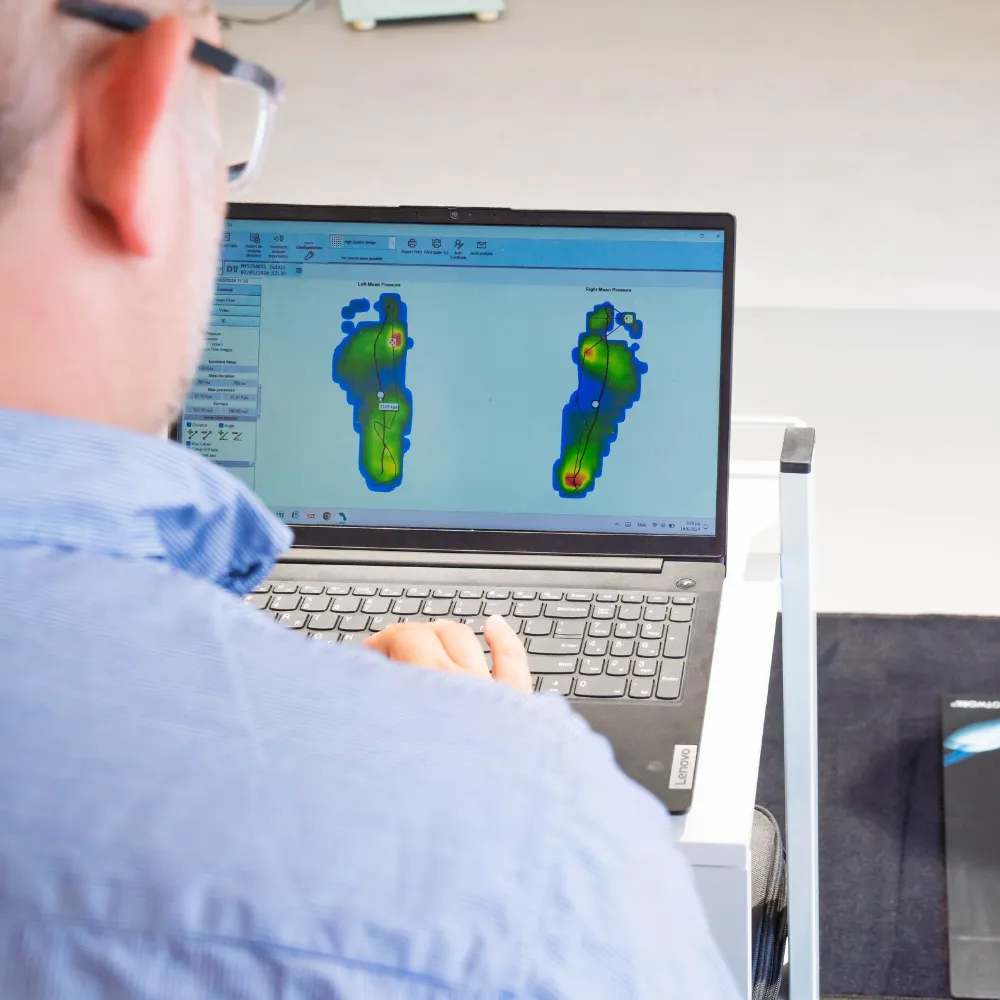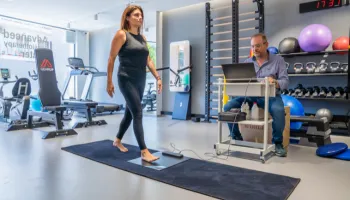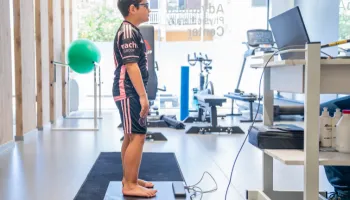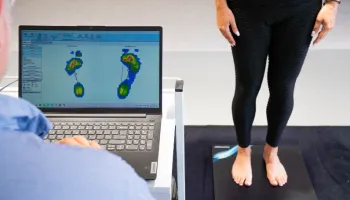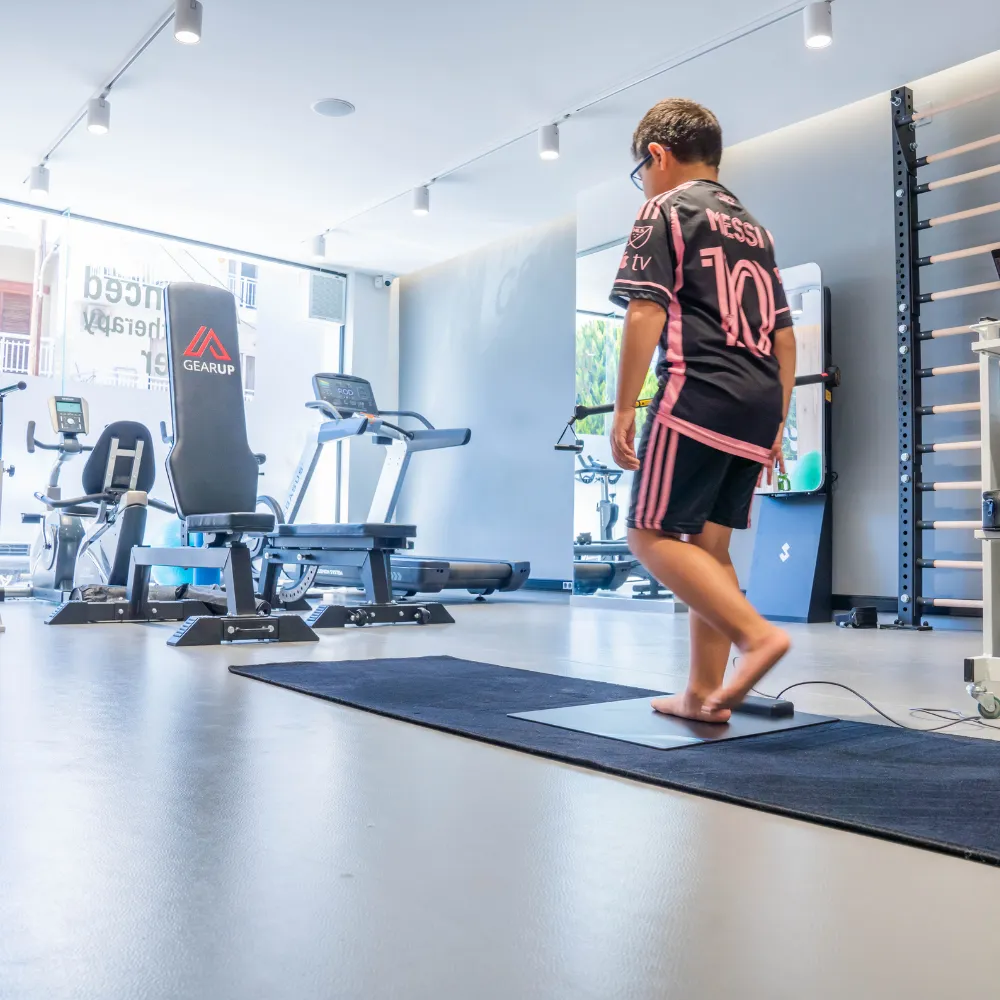Foot scan
What is a Foot Scan?
The foot scan (static or dynamic) is a special test that analyses and digitally records the distribution of pressures on the foot. Through the foot scan, physiotherapists collect important data and can diagnose possible conditions of the lower limbs and spine due to anatomical or other functional problems.
The test is suitable for adults and children for preventive and diagnostic reasons, while the procedure is short, completely pain-free and radiation-free..
The test is suitable for adults and children for preventive and diagnostic reasons, while the procedure is short, completely pain-free and radiation-free..
How is a Foot Scan taken?
The foot scan at PHYSIO4U is performed on a special digital platform, the foot scanner, which measures the statics and mechanics of the body. The platform is connected to a computer, where a 3D image of the foot is displayed. The machine, using its thousands of sensors, accurately records all the pressures exerted on the various points of the foot, as feet alternate in standing position and when walking.
The test essentially consists of two phases, the static and dynamic analysis of the feet. Once completed, the foot scan results are evaluated by the physiotherapist, who proceeds to prepare an individual treatment plan and, if necessary, prescribe orthotic insoles.
The test essentially consists of two phases, the static and dynamic analysis of the feet. Once completed, the foot scan results are evaluated by the physiotherapist, who proceeds to prepare an individual treatment plan and, if necessary, prescribe orthotic insoles.
For which cases is a foot scan recommended?
The foot scan is recommended for any person που καταπονεί ιδιαίτερα τα κάτω άκρα του, όπως οι αθλητές, οι έγκυες με πόνους στη μέση, παιδιά με πλατυποδία, αλλά και άτομα που ταλαιπωρούνται από καθημερινή ορθοστασία.
At PHYSIO4U in Rethymno, the test is usually performed for conditions such as the following:
• Leg length discrepancy
• Flat feet, Forefoot varus
• Pes cavus, Knock knees
• Metatarsalgia, Morton's neuroma, Bunion
• Chondropathy or osteoarthritis of the knees
• Scoliosis, Kyphosis
• Diabetic foot
• Sports injuries
• Neurological conditions
At PHYSIO4U in Rethymno, the test is usually performed for conditions such as the following:
• Leg length discrepancy
• Flat feet, Forefoot varus
• Pes cavus, Knock knees
• Metatarsalgia, Morton's neuroma, Bunion
• Chondropathy or osteoarthritis of the knees
• Scoliosis, Kyphosis
• Diabetic foot
• Sports injuries
• Neurological conditions
What are the benefits of a foot scan in physiotherapy?
The foot scan is an important tool for Physiotherapy. Combined with the physical examination, symptoms’ evaluation and the overall clinical presentation of the patient, it allows the physiotherapist to gather important information about the biomechanical behaviour of feet and identify possible abnormalities in movement.
Utilising the results of the foot scan, physiotherapists can:
• accurately distinguish the type and severity of the problem
• effectively adjust their treatment plan, targeting directly the affected area
• prepare a personalised exercise programme
• recommend appropriate footwear or orthotic insoles
• optimise the function and performance of the patient's feet
Utilising the results of the foot scan, physiotherapists can:
• accurately distinguish the type and severity of the problem
• effectively adjust their treatment plan, targeting directly the affected area
• prepare a personalised exercise programme
• recommend appropriate footwear or orthotic insoles
• optimise the function and performance of the patient's feet
Orthotic insoles are manufactured specifically for each person after the foot scan and clinical examination and are placed in their shoes for therapeutic purposes. Their use allows the uniform distribution of pressure across the entire surface of the foot, the proper support of the bones of the foot and tibia and the relief of strained joints. At the same time, they facilitate daily activities and help improve athletic performance.
What you need to know regarding your first appointment
Save valuable time by coming prepared to your first appointment at the PHYSIO4U physiotherapy centre: bring everything that is necessary for us to start your case assessment right away!
Medication
Make a list of the medications you are taking and give this information to your physiotherapist during the assessment.
Recent tests
Make sure you have your most recent medical diagnosis with you, along with the results of any recent tests, such as x-rays, CT or MRI scans, etc.
Comfortable clothing
Wear comfortable clothes, especially in the area of the body that is affected or painful. This will allow the physiotherapist to better access that area and carry out the treatment most effectively. In addition, comfortable clothing will allow you to feel at ease and relaxed during the session.

